18-6-2024 (BANGKOK) In a growing trend that has caught the attention of authorities and observers alike, the southern provinces of Thailand have become a popular destination for Malaysian men seeking to enter into ceremonial polygamous marriages. According to reports, at least 30 couples from Malaysia undergo such ceremonies at the Narathiwat Islamic Religious Council every month, with many hailing from the neighbouring states of Kelantan and Terengganu, while others travel from as far as Kuala Lumpur.
The Bernama news agency, which reported on this phenomenon on Monday, shed light on the specific conditions and scrutiny that these couples must undergo before being granted approval for their polygamous unions. “However, getting married in southern Thailand is not as easy as it may seem. There are specific conditions that must be met, including background checks on the couple,” explained Abdul Aziz Mamatn, the deputy president of the provincial council.
While Aziz did not delve into the reasons behind Narathiwat’s growing popularity as a destination for Malaysian men seeking polygamous marriages, a practice permitted by Islam, this trend appears to extend beyond the province’s borders. According to the Malaysian consulate in Songkhla, approximately 300 Malaysian couples tie the knot in the province every month, as reported by the Malay Mail in February, citing a report from the Malaysian-language daily Sinar Harian.
Consul Ahmad Fahmi Ahmad Sarkawi revealed that Narathiwat, Yala, Pattani, and Satun have also emerged as popular destinations for such marriages, highlighting the broader appeal of Thailand’s southern provinces for this purpose.
While polygamy remains a contentious and divisive issue, with proponents arguing for its religious and cultural significance and critics raising concerns about gender equality and the potential for exploitation, the influx of Malaysian couples seeking these unions in Thailand has sparked discussions about the underlying factors driving this phenomenon.
Some analysts suggest that the perceived ease of navigating legal and bureaucratic hurdles in Thailand’s southern provinces, coupled with the cultural and linguistic similarities shared with Malaysia’s northern states, may contribute to the region’s appeal for Malaysian men seeking to enter into polygamous marriages.
Others point to the potential financial considerations, as the costs associated with such ceremonies and the subsequent maintenance of multiple households may be more manageable in Thailand compared to Malaysia.
Regardless of the motivations, the growing trend has raised questions about the adequacy of existing legal frameworks and safeguards to protect the rights and well-being of all parties involved, particularly the women entering into these unions.




